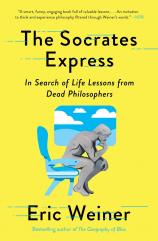The Socrates Express: In Search of Life Lessons from Dead Philosophers
Review
The Socrates Express: In Search of Life Lessons from Dead Philosophers
If the subject of philosophy conjures up visions of bearded, pipe-smoking men in tweed blazers, uttering oracular pronouncements from deep in their leather chairs, journalist Eric Weiner’s THE SOCRATES EXPRESS will come as a pleasant surprise. Part high-level survey of the central ideas of a diverse group of philosophers, part memoir, part “how to” book and part travelogue, the former NPR reporter’s latest book is an invigorating introduction to some of philosophy’s eminently practical uses.
In choosing his 14 thoughtful teachers, Weiner applied two simple criteria: “[D]id these thinkers love wisdom and is that love contagious?” In each chapter, he assesses the central idea or method of his subject, framed as an invitation to consider how that approach might aid him and others to lead a more fulfilling life. For Socrates, then, the question is how to wonder; for Thoreau, it’s how to see; for Gandhi, it’s how to fight; and so on through a range of character traits and ways of looking at the world.
"...an invigorating introduction to some of philosophy’s eminently practical uses.... [W]ith Weiner as your smart and sympathetic guide, you’ll find the journey a rewarding one."
Weiner doesn’t limit his consideration to towering figures from the history of philosophy, devoting a chapter to the Japanese courtesan Sei Shōnagon, whose diaristic work THE PILLOW BOOK, from the early 11th century, teaches him how to appreciate the small things, or Simone Weil, whose brief life is a master class on how to pay attention. If you’ve never been sure about the difference between Epictetus and Epicurus, wonder what’s fueling the contemporary fascination with Marcus Aurelius’ MEDITATIONS, or have always wanted to know what Schopenhauer’s THE WORLD AS WILL AND REPRESENTATION is all about, Weiner will open those doors for you.
Both gently self-deprecating and at times harshly self-critical, Weiner contemplates how all of these teachings might lead him to greater self-knowledge and, he hopes, self-improvement. He’s a serious man of ideas, but also one who’s concerned about his ability to confront head-on the face of the middle-aged man staring back at him in the mirror or his tendency to “moan and groan and carp and kvetch and bellyache” --- in short, to be a true “whiner.”
Above all, THE SOCRATES EXPRESS is refreshingly free of prescriptiveness. Instead, Weiner invites each of us to join him in a process of self-examination and to consider how these bits of wisdom, ancient and modern, might help us live more meaningful lives, even as we’re cognizant of his warning: "Borrowed truths fit about as well as borrowed underwear, and are just as icky. You either know something in your heart or you don’t know it at all.”
But as much as these philosophers unite in teaching us how to live better, Weiner is wise enough to recognize that the most important lesson any human being needs to learn is how to die. For that, he turns to 16th-century French philosopher Michel de Montaigne, a man he calls his “philosophical soul mate.” And in what he characterizes as the fruit of Montaigne’s lifelong contemplation of death, one that ultimately led him to a “full and generous” acceptance, he learns how “awareness of death enables us to live more fully.”
In any book of this sort, the author will be compelled to simplify and elide complex ideas, and though Weiner undoubtedly would be the first to abjure any claim to comprehensiveness, his engagement with each thinker is serious, if occasionally whimsical. In all, he’s neither glib nor dismissive, even when he’s taking exception to one of his subject’s ideas or philosophical approach. For readers who want to dig more deeply into the work of a particular philosopher, he offers both extensive source notes and an ample bibliography.
As much as THE SOCRATES EXPRESS is about quiet reflection, Weiner’s wide-ranging journeys infuse it with a feeling of energy. Many of his musings take place on trains --- from the DC Metro to the Swiss Federal Railways, to Japan’s bullet train. “I love the experience: that rare combination of expansiveness and coziness only travel by train provides,” he writes. Whether he’s invoking Marcus Aurelius to cope with an early morning wakeup call in his sleeper berth on an Amtrak train in North Dakota, or pondering Gandhi’s ideas about nonviolence as he struggles to secure a seat on an Indian train known as the Yoga Express, the rails provide a mode of travel that stimulates his creativity. Joining Weiner on a visit to France for his contemplation of Simone de Beauvoir and Montaigne is his precocious 13-year-old daughter Sonya, “my Socrates,” whose sometimes barbed comments directed to the father she calls “Old Man” help him refine his thoughts on aging.
Whether your encounter with the ideas of Eric Weiner’s pantheon of great thinkers only took place in a long-ago college philosophy survey, or you’ve never considered them, you’ll find something in THE SOCRATES EXPRESS to inform or stimulate you. In either case, with Weiner as your smart and sympathetic guide, you’ll find the journey a rewarding one.
Reviewed by Harvey Freedenberg on August 28, 2020
The Socrates Express: In Search of Life Lessons from Dead Philosophers
- Publication Date: August 10, 2021
- Genres: Essays, Nonfiction, Philosophy, Travel
- Paperback: 352 pages
- Publisher: Avid Reader Press/Simon & Schuster
- ISBN-10: 1501129023
- ISBN-13: 9781501129025




